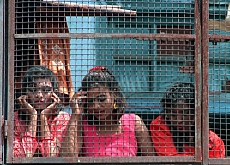Political will needed to fight trade in humans

Switzerland has taken part in a high-level conference in Vienna focusing on stepping up the fight against human trafficking.
A Swiss expert who attended Friday’s meeting said the aim of international action was not only to combat trafficking but also to provide better protection for its victims.
The one-day meeting was organised by the Austrian government and the Organisation for Security and Cooperation in Europe (OSCE).
There are no reliable statistics, but the Council of Europe estimates that as many as 500,000 people have been subjected to human trafficking on the continent.
Addressing the meeting, the OSCE special representative on combating human trafficking, Helga Konrad, said it was important to take a victim-centred approach and address the whole chain of criminal networks.
“Traffickers ruthlessly exploit the total lack of social and legal protection for victims of trafficking,” she said.
“We must create or significantly strengthen networks of support services.”
Ruth-Gaby Vermot-Mangold, Swiss parliamentarian and member of the Council’s Parliamentary Assembly, says there are as many as 3,000 victims, mostly women and children, in Switzerland alone.
She told swissinfo international accords, treaties and conventions include sufficient measures to combat trafficking, but governments “lack the political will” to implement them.
At the conference, Vermot-Mangold will highlight the latest treaty, the Council of Europe Convention on Action against Trafficking in Human Beings.
Signatories
Only 25 of the council’s 46 members have so far signed the accord, and Switzerland is not one of them.
The Swiss parliament is expected to debate the issue next week, but there are no guarantees the treaty will win approval, since it demands that governments support victims, whether they have work permits or are in the country illegally.
The clause granting victims physical and psychological assistance, counselling and accommodation runs counter to Switzerland’s immigration laws.
The federal authorities introduced a series of measures over the past few years to clamp down on asylum seekers and illegal immigrants, refusing to consider the case of any person not in possession of valid identity papers.
Vermot-Mangold told swissinfo that the convention will grant victims 30 days to escape from the influence of the traffickers and to decide whether to press charges.
New identity
In cases where there is a danger to their lives or where they need to stay to cooperate with a criminal investigation, they are also entitled to renewable residence permits, and even a “new identity”.
She said countries like Switzerland had to make a greater effort to raise awareness through their embassies, to reach women and girls who may be duped into believing they are getting a permit to work abroad as household servants or waitresses.
“There are many victims in Switzerland who are under age but they came here with papers saying they are 18 or 19 years old,” she said.
Many of the women forced into the sex trade in western Europe are Ukrainians, Uzbeks, Moldovans and Romanians, many having first passed through so-called transit countries including Albania and Turkey.
Vermot-Mangold said action needed to be taken fast to combat the growing problem.
She said around 40,000 sex workers would descend on Germany later this year for football’s World Cup.
“A large number of these women will be victims of trafficking, so we need instruments to combat the criminal activity.”
swissinfo, Dale Bechtel
Speaking at the Vienna conference are top-level European politicians including:
OSCE chairman, Karel De Gucht (Belgium’s foreign minister)
Benita Ferrero-Waldner, EU commissioner for External Relations
Liese Prokop, Austrian interior minister
Antonio Maria Costa, Executive director of UN Office on Drugs and Crime
Ruth-Gaby Vermot-Mangold, Swiss parliamentarian and member of Council of Europe’s Parliamentary Assembly
The trade in humans is punishable by law in Switzerland.
The government set up the Coordination Unit against the Trafficking of Persons and Smuggling of Migrants in 2003.
Its aim is to put in force the United Nations Convention against Transnational Organized Crime and its protocols.
However, Ruth-Gaby Vermot-Mangold says the office, with a staff of five, does not have the resources to be effective.

In compliance with the JTI standards
More: SWI swissinfo.ch certified by the Journalism Trust Initiative











You can find an overview of ongoing debates with our journalists here . Please join us!
If you want to start a conversation about a topic raised in this article or want to report factual errors, email us at english@swissinfo.ch.